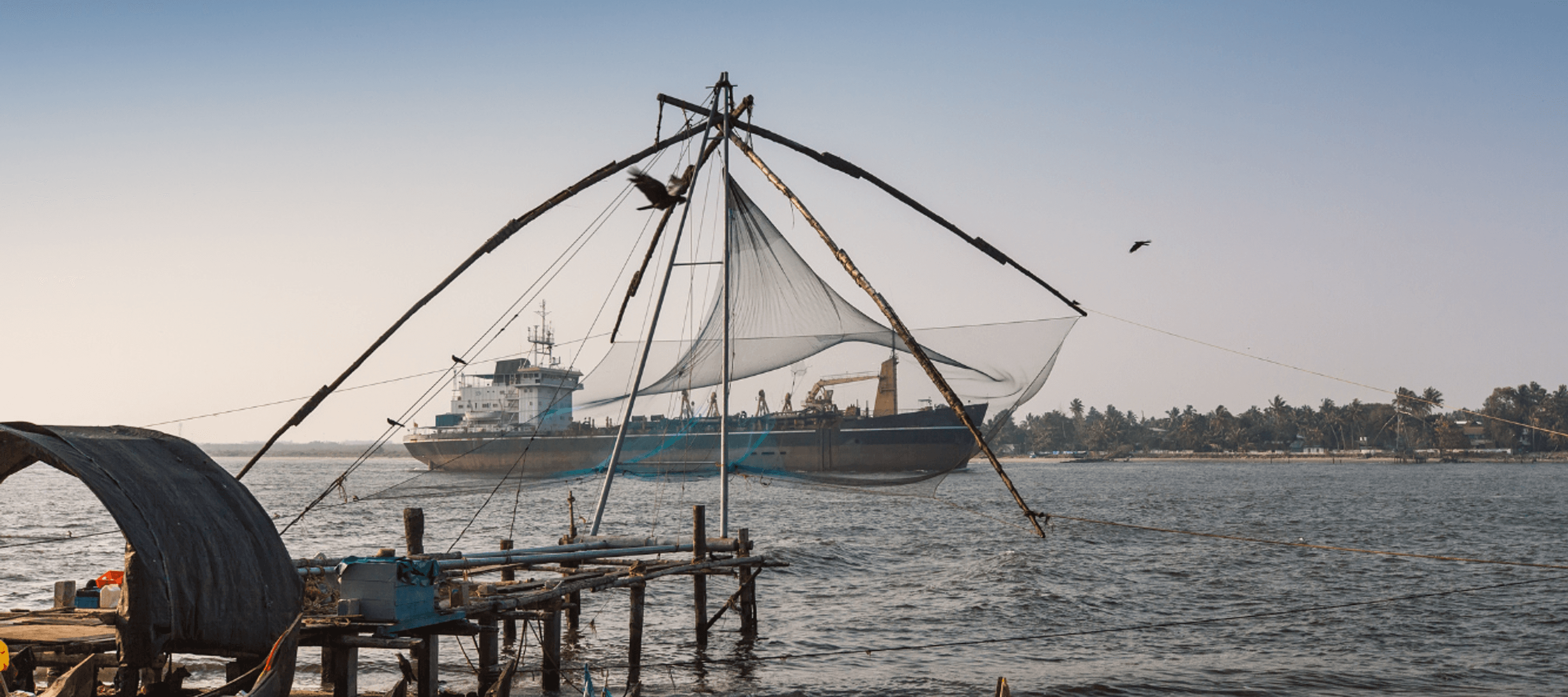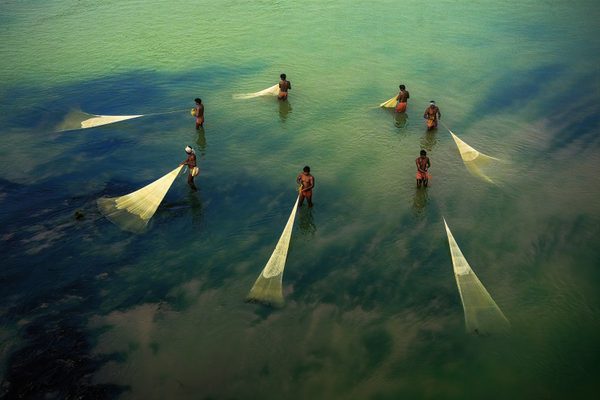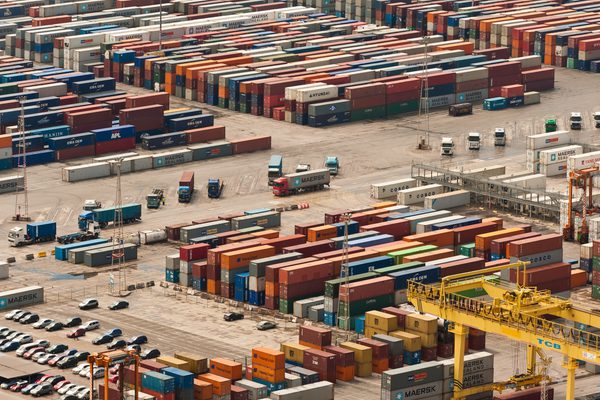Caught in troubled waters: climate change and industrial shipping threaten fishing communities around the world
6 November 2024 | 5 minute read

Last month, I visited one of the southernmost Indian fishing villages in the Tuticorin district of Tamilnadu-Punnaikayal, where the twin challenges of the climate crisis and the expansion of industrial fishing are having devastating impacts on the livelihoods of local communities. My visit followed a workshop hosted by IHRB and Mission to Seafarers, which brought together Indian crew members to discuss issues impacting their lives.
Many seafarers, when not working onboard merchant vessels, are fishermen. Fish once commonly found along the coast of Tamilnadu are increasingly moving to deeper seas as a result of rising ocean temperatures due to climate change. Punnaikayal fishermen face a difficult choice: either stop fishing altogether, with dire consequences for local livelihoods, or take risks to venture further out to sea, mostly into Sri Lankan waters. Many have chosen the latter, leading to arrests and seizure of their boats by Sri Lankan authorities. The arrests and boat seizures are based on Sri Lanka’s Fisheries (Regulation of Foreign Fishing Boats) Act, 1979, which bans unauthorised foreign fishing. Indian authorities have primarily taken a diplomatic approach, advocating for humane treatment and the quick release of fishermen. These arrests have increased dramatically, mirroring a trend seen in West Africa, where artisanal fishers increasingly face an additional challenge - competition from industrial fishing vessels.
For generations, local fishing communities have lived in harmony with the sea. But climate change and industrial fishing practices have disrupted this balance.
Rising ocean temperatures have led to the displacement of fish populations, pushing them into deeper waters. Sea temperatures in the Indian Ocean have risen by 1°C in the past 50 years, resulting in a 40% reduction in fish like Hilsa, which was once found in abundance in rivers and coastal areas, and has now shifted towards deeper waters.
Deep-sea business ventures and industrial fishing are taking advantage of these climate related shifts, making the situation even more challenging for those who depend on the sea for their livelihoods.
The role of distant water fishing: big business, bigger impact
While small fishermen continue to face significant challenges, distant water fishing thrives, drawing strength from advanced technology and state-of-the-art vessels that allow them to exploit marine resources beyond the reach of traditional fishing methods.
In the Bay of Bengal, industrial fishing fleets from China, South Korea, and Thailand have expanded operations, capitalising on regional trade cooperation agreements. In 2022, these foreign fleets accounted for nearly 70% of the deep-sea catch in this region, leaving little for small-scale fishermen from India, Bangladesh, and Myanmar. The influx of industrial operations has driven local fishermen further into distant water, often without reliable navigation technology or sturdy vessels, leading to heightened sailing risk and possible border crossing leading to arrests.
This dynamic is not unique to the Bay of Bengal. Across the African coastline, foreign industrial fleets, particularly from the European Union, China, and South Korea dominate fishing waters. In countries like Senegal and Mauritania, where fish provide a critical source of food and employment, the introduction of industrial fishing agreements has led to overfishing and depletion of fish stocks traditionally harvested by artisanal fishers. In many cases, these fleets engage in IUU (illegal, unregulated, and unreported) fishing, encroaching on protected zones meant for local fishers. A study noted that 6% of industrial fleets' activities involve illegal fishing in such zones, with limited enforcement in countries like Somalia leading to even more rampant violations.
A call for responsible shipping
The precarity of small-scale fishermen requires considerable engagement from governments, businesses, and multilaterals to address the multifaceted challenges they face. Effective intervention is essential to ensure equitable resource management, protect the rights of fishing communities, and promote sustainable fishing practices.
ILO's Work in Fishing Convention (C188) provides guidelines to improve working conditions, ensuring fair wages and protection against exploitation. Similarly, FAO's Port State Measures Agreement (PSMA) is crucial in combating illegal, unreported, and unregulated (IUU) fishing by preventing illicit catches from entering the market.
Thailand, Indonesia, Philippines, South Korea, and New Zealand have all enacted laws to regulate the sector, but achieving effective enforcement and cohesive global coordination remains a significant challenge. Thailand's 2015 legislation was introduced to control vessel movements and confine fishing to national waters to curb transshipment—a practice linked to illegal fishing and labour abuses—and by establishing designated fishing days and zones. Indonesia bans foreign vessels in its waters and enforces strict anti-IUU measures, while South Korea and New Zealand have tightened control over transshipment and require fair labour standards on foreign chartered vessels.
The EU's Common Fisheries Policy sets quotas, limits fishing days, and enforces regulations to protect marine biodiversity and worker rights across member states.
These laws are important, but the fishing industry also has a responsibility to act. Those involved in distant water fishing, which profits from changing ocean dynamics, must help ensure that small fishermen aren’t left behind.
The following actions would help alleviate the current crisis facing local fishing communities:
- Adopt sustainable fishing practices: Companies must prioritise sustainable fishing methods that allow for the replenishment of fish stocks, ensuring the long-term viability of both large-scale operations and small fishing communities. Sustainable fishing initiatives in the Pacific Ocean have helped stabilise fish populations, providing a model that can be replicated elsewhere. Fish stocks in the region have rebounded, leading to an increase in legal catches by almost 60 percent in national waters between 1997 and 2012.
- Provide support to Small fishermen: Large fishing businesses, which often have technology and resources unavailable to small-scale fishermen, can support local communities by offering technological upgrades, such as better navigation and fish detection systems. This can help reduce the risk of boundary violations and arrests.
- Collaborate with local communities and governments: The fishermen in Punnaikayal want more collaboration between businesses, local governments, and fishing communities. Fishing industry representatives should work with governments to establish "safe zones" where small fishermen can continue their activities without the threat of encroaching on international waters.
- Ensure transparency in supply chains: By establishing transparent and traceable fish supply chains, companies can help reduce illegal fishing and provide customers with sustainably sourced products, while offering local fishermen a stable and ethical market for their catch. Disclosing supply chain data using publicly available sources like Open Supply Hub can enhance transparency hence overall protection.
The escalating plight of small-scale fishermen, caught between the harsh realities of climate change and aggressive deep-sea industrial ventures, calls for urgent action from both governments and businesses. The depletion of fish stocks due to warming oceans and industrial encroachment forces these fishermen into dangerous waters, risking their livelihoods and safety. As the fishermen of Punnaikayal village made clear, stricter environmental regulations and sustainable practices are needed to protect marine ecosystems and ensure the economic viability of fishing communities. By fostering collaboration and enforcing responsible policies, all involved in the fishing industry can help preserve and promote ecological sustainability.
IHRB, along with Mission to Seafarers, recently hosted a workshop in Tuticorin, India, which brought together Indian crew members to discuss issues that significantly impact their professional and personal lives.




